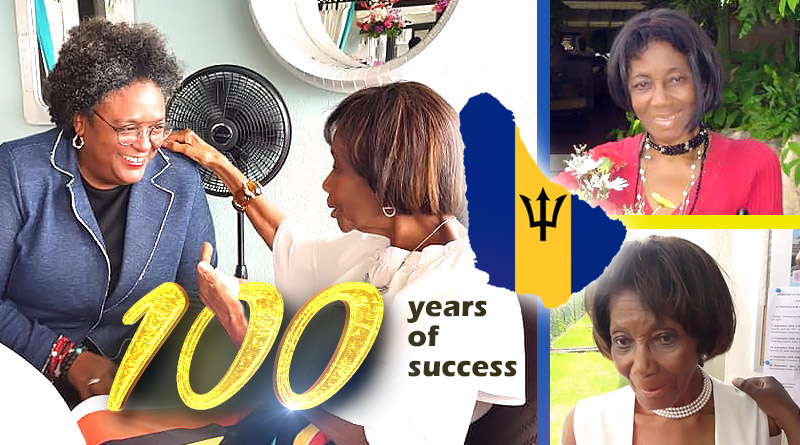Barbados Celebrates With Centenarian Avisene Carrington
Years after graduation, memories of a happy time remain etched in the minds of thousands of past students of centenarian Avisene Carrington, known from childhood as Avis, who reached this venerable milestone September 17th, 2018.
Celebrating with church service at the St. Cyprian’s Anglican Church on the eve of her 100th birthday and, a week later, a lunch at Radisson Aquatica Resort.
From the opening of her Merrivale school at her Pine Road residence in 1959 until she closed its doors over some 50 years later in 2010.
Mrs. Carrington has outstandingly shaped the lives of many of our island’s brightest and best, who have, in turn, imparted the values and principles instilled at this revered institution.
Even before that, as a young teacher at St. Giles’ Boys, where she taught pupils such as Sir Wes Hall in the 40s, she was destined for greatness. She evidently left an indelible impression on my father, Winston Layne, who, when he had his own children, thought there was not better educational institution to send my brother and in the 70s than to Merrivale.
On the student roll at that time were distinguished musicians, Nicholas Brancker, Arturo Tappin, attorney Andrew Pilgrim, MP William Duguid, Former MP and Minister of Tourism Richard Sealy and the children of former cricketer and businessman Rawle Brancker, former Chief Justice David Simmons and accountant Ken Hewitt, who recently acted as Governor-General.
Among this elite group was our country’s first female Prime Minister, the Hon. Mia Mottley. “Mrs. Carrington was first class – there was no doubt about it. To remain in teaching for 70 plus years … to have young children shouting, playing [and] romping in your ears, you’ve GOT to love it.”
HOME SCHOOL
Situated at No. 15 Pine Road St. Michael, the school started with six children, including her 3-year old son, Ian. Mrs. Carrington explained during her recent birthday visit from the Governor-General: “I opened Merrivale School because there was something missing for me in the Government Service. I wanted to create a different atmosphere for children.” She chose the name to reflect the “new approach” founded on the joy of childhood.
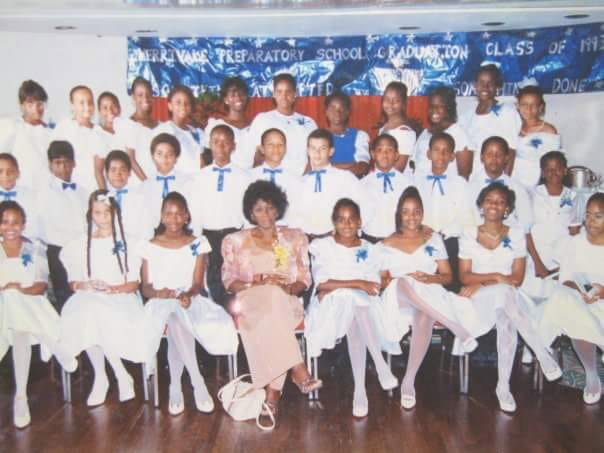
The dedicated teacher, known for her “firm, but flexible hands-on approach”, recalls, “Ronnie and Shelley were already at St. Gabriel’s… and [Ian] was the only one at home with a babysitter … Every morning it would be tears [and] out of the blue sky, I said to myself… maybe this is the time I should make the break from the government system and open a school with Ian.”
Ian, who was in the class of 1966, mused, “I think she was harsher on me than virtually anyone else because…to the extent that I did well or poorly…., I was a reflection on her.” He surmised, “Perhaps she didn’t want to make sure she didn’t display any bias towards me … [but] she went the other way… I got a pretty tough deal.”
Acknowledging that the division between home and school would have been nebulous for her younger son, the estimable educator, said students would be spanked if they broke rules and laughingly added, “He broke more rules than the others.”
Whether it’s playing host to a visitors to the island or being part of a neighbourhood committee, Mrs. Carrington can always be counted on to be present and active.
A former resident of Belleville recalls meeting her when Pine Road was being widened and there was dissatisfaction over how things were being done, and the concerned citizens of the area met to discuss how to approach the government. The retired Personal Assistant said, “I always admired her, and I liked her attitude toward life. She was not one to sit down and let things go over her.” After that, whenever they happened to meet up, they would chat.
On Mrs. Carrington’s enviable fashion sense and seeming agelessness, she remarked, “When you walked behind [her], you thought she was a far younger woman than she was….she always dressed [smartly and walking [so] sprightly… she never looked her age!”
EARLY HISTORY
Christened Avisene Caesaretta Inniss to Robert and Beatrice Inniss, she grew up in the Ivy, St. Michael.
Avis’ father was a conductor on a train from Bridgetown Belleplaine to St. Andrew and, admirably, saw the value in investing in his children’s education. He was “the sort of person who looked ahead of the times … so we had everything that made our childhood lively and happy,” Mrs. Carrington summed up.
She was one of three daughters; her older sister, Erdine, was a seamstress, and Constance, known as “Aunt Dan”, was a teacher and became headmistress of St. Michael’s. Her elder sister was a tomboy like herself, while Constance, “the bookworm” who was later awarded a scholarship to Queen’s College, avoided the scrapes of the other two girls who care-freely roamed the woods at Blenheim, climbing trees and gathering grass for basket-weaving.
With their mother a devout Christian, the family worshipped at St. Barnabus Anglican Church, and Avis and her siblings were staunch members of the Belmont Methodist Church Sunday school. She attended Belmont Primary – about a mile from her home, on foot – when school hours were 10 a.m. to 4 p.m. Recounting a Barbados of poverty where “most of the children went to school bare footed”, Avis said her family was fortunate to have “everything that we needed.”

She moved on to St. Michael’s Girls, which was about $21/ term, in an era when Junior and senior Cambridge exams were done under the British system, and remained there until she was 18 and started teaching. She was mentored by the acclaimed Charles Wilkinson “Wilkie “Cumberbatch and pursued formal training at Erdiston Teachers’ Training College.
Avis Inniss married attorney Vere Carrington in December 1947 at the St. Matthias Church, and became a member of St. Cyprian’s when the family moved to her current Pine Road residence in 1956.
Looking back, Mrs. Carrington explained, “You weren’t paid when you started teaching.” There was a probation period before “you satisfied the powers that be that you were really ready to move on.” Other than being a domestic worker, there were only effectively three career options for women – nursing, teaching or being a seamstress.
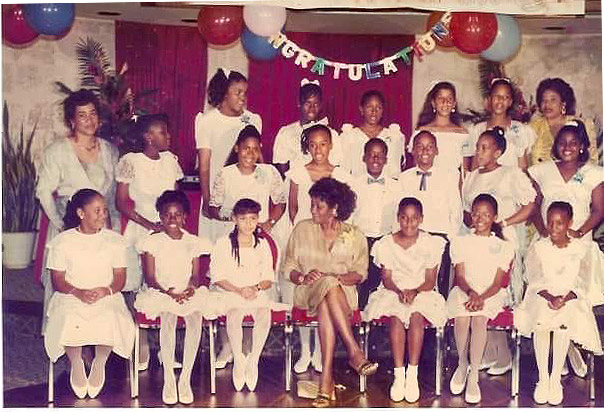
Since she wasn’t keen on nursing and couldn’t sew well, Avis opted for the education field. “Deep down I always wanted to be associated with children.” From early in life she realised this is what she “was really cut out to do.” As a child, without the amenities of today, she used to play School, collecting any available objects and making them “students”.
Sir Wes Hall first met the young Miss Inniss in 1941 at age four, but didn’t actually have her as his teacher until he was in Class One. He enthused, “She was fantastic teacher, exuding love, was patient … had Christian thoughts” and was a “very good communicat[or]”.
When his family moved to the Back Ivy, about 50 yards from her home, he walked past the bungalow daily with pride. “We thought we had bragging rights for Miss Inniss, since we were lived in the same street … Everyone loved her.” He shared, “I was so confident coming out of her class that I boldly postulated that I was going to go to Combermere … and play cricket for the West Indies”, which, according to his detractors, was an impossible feat.
PHILOSOPHY
The veteran educator said she always felt primary school was “rigid” – “being seen and not heard”, and “not the best way to be with children”. She recalled that children were lashed for every conceivable “offence” – for example, being late and not knowing times tables.
In spite of this, she said, “I was still was very drawn to teaching… my focus was always on helping children.” This inspired her to want to create “a different atmosphere”, using unorthodox methods.” If a child was absent and missed anything, she would ensure she took time out to fill him or her in. Some insight came when she started subscribing to a British magazine “Child Education”, and thought it would be wonderful if these methods could be adopted in Barbados.
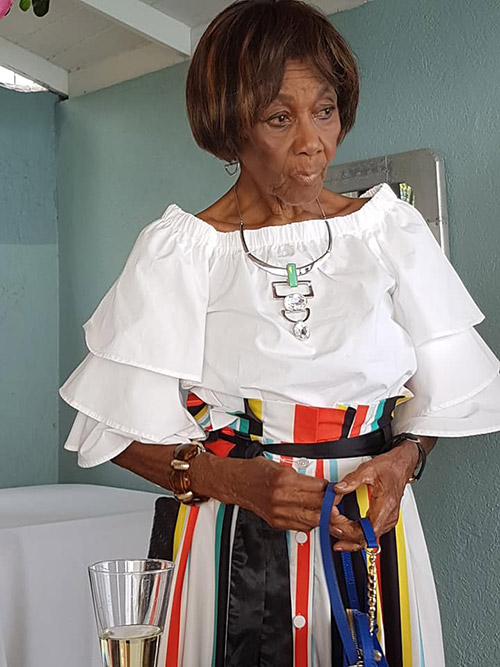
“Children were hands-on with things … you didn’t just sit down … children were able to move around and use teaching aids… I always hankered after a system like that,” she mused. So, after 20 years at St. Giles, Mrs. Carrington opened her own school – what many generations have now come to know as Merrivale Preparatory.
She noted, “Very seldom after the children settled in did [they] not want to come to school.” Even when they were not well, they wanted to be there because it was an “atmosphere of fun”. Strangely enough, I never advertised the school… [it] advertised itself… that’s how the school grew.”
It first expanded to the verandah, and, subsequently, to the side and back of the house. Merrivale’s roll increased rapidly, and housed 220 at its highest count in the 1980s. In 1966, when floor space was running out, her dutiful husband, to whom she was married for 45 years, decided to erect a structure at the back of the property, sacrificially overseeing the construction in 1967 while the family was away on their summer holiday.
STUDENT AND TEACHER RELATIONSHIPS
Mrs. Carrington recalled, “I had a very good relationship with my staff… all of [them] came to me from school and observed classes” before being given the responsibility of a teaching.
Longstanding teacher Beverley Jones, said, “She is a “phenomenal” person… “There will never be another like her… She was an all-rounder and got involved with all aspects of the school … She would say, ‘Don’t shout at the children… just talk to them [and] … be firm’.”
Jennifer Holder (nee Payne), describes her former employer as “caring, loving [and] understanding” with an enviable go-getter attitude.
“She never let the children get away with [not getting something] done.” There was an unspoken policy that “if children didn’t understand during the class, we gave of our lunch time to helping [the] slower [ones] to achieve what they would have missed … and most of the time it worked.
“You would never pass and [not] see a child at Mrs. Carrington’s side” – one on each side. Mrs. Holder remarked, “It was amazing how she could eat her lunch so quickly to get back out to help those slow[er] children. She was always there [for] them… It went through the school. You modelled what you [did after] her.”
She emphasised that reading and phonics were essentials on the curriculum.” There was hardly a child that could not read…If there was, it meant he had a disability – but even those children succeeded.”
Mrs. Carrington reflected: “I ha[d] to make sure that you [were] familiar with whatever principle I [was] putting out there. I have always tried to make them understand [what] I teach…I do not believe that it is to children’s advantage to [get] past papers all the time.”
She stressed, “I have never given prizes to Common Entrance students. I don’t care how high your marks are. Everybody at the end of their time at the school received a certificate … everyone got the same thing.”
Addressing some negative practices in the field, the founder and retired principal of Merrivale pointed out, “Unless you have been associated with children, “You don’t realise the damage done to children who are not what you call ‘bright’… I don’t think children should be relegated as failures.”
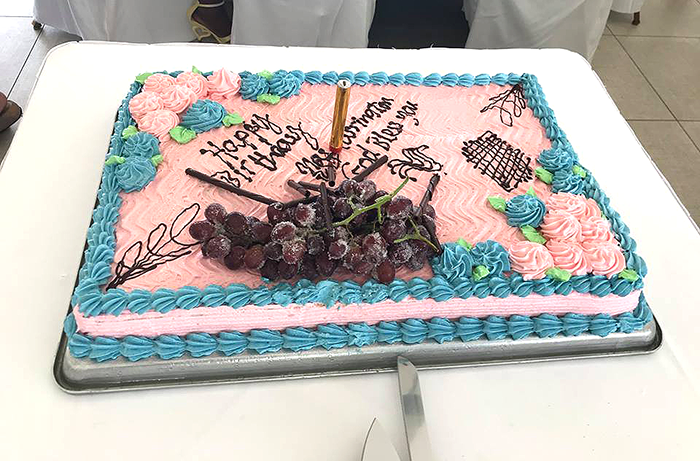
The exceptional stalwart educator who has shared the joys and disappointment of her pupils, dislikes the terms “top boy” and “top girl”. Instead, she [believe[s] in a child doing its best …That is why a lot of children greet me as they do… They know I care about them … and their attainment … I don’t want to make anybody to feel like they are failures.
“We naturally enjoy the progress and successes” of the academically inclined students”, she observed. However, she implored, “Spare a thought to those other children who are regarded as “failures … I don’t think it’s good at all for their morale.”
Her son, Ian, endorsed these sentiments: “She’s always had an interest in children, especially those who were not doing as well as others … she would always take those children aside, spend more time with them [and] reinforce concepts. Her goal was to make sure that all the children did as well as possible.”
Although a disciplinarian, Mrs. Carrington doesn’t believe in administering excessive corporal punishment. “Give them two or three lashes, and make them realise … the message you’re trying to send. You do not have to be cruel, but children have to be disciplined.” From that point of view,” she contended,“some good slaps have their place.”
On being conferred the Silver Crown of Merit in 1994 in recognition of her service to Education, the gracious centenarian said, “I was totally surprised…didn’t really feel I was worthy of such recognition … I felt honoured.”
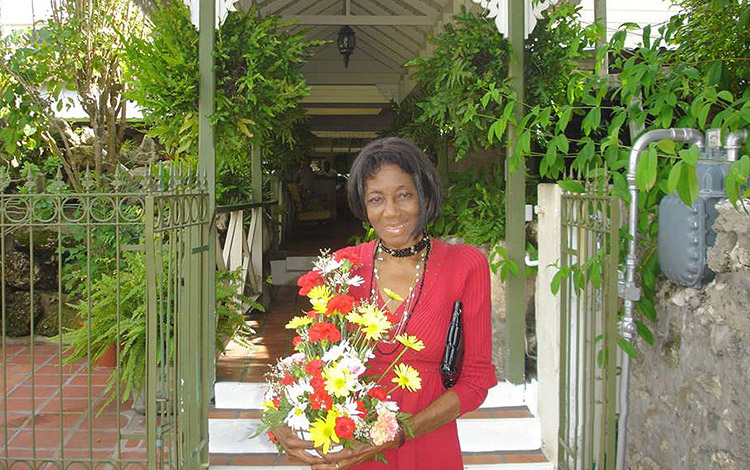
When Merrivale finally closed after 51 years, due to significantly dwindling numbers, Ms. Jones said, “It was such a sad occasion… the teachers didn’t want to leave… it just didn’t feel right.”
Of the landmark occasion, Mrs. Carrington admitted: “It was hard for me to retire. My children didn’t let forget that they wanted me to retire,” she chuckled, “and I could see their point of view… I realise that the time must come when you have given your service to your country, and then you have to sit back and let life go on.”
LEGACY
Prime Minister Mottley, from the class of 1977, affirms: “This country has been fortunate to have Avis Carrington as one of our citizens … and one of the builders of this nation… Her role in nurturing tens of thousands of Barbadians has perhaps has been one of the greatest contributions in the post Independence Barbados – and even pre Independence – in terms of the building out of the Barbadian that we know … respect and want to be again.
Independence Day in Barbados – CLICK HERE
“She and others like her are the ones we have to give thanks for… Avis Carrington is one of those giants of Barbados, and we owe her a significant debt because she didn’t treat is as a job. For her it was a passion – and remains a passion.”
Mrs. Carrington acknowledged, “Merrivale has been known far and wide across Barbados, but the school was not run by just one person … I would like to express my eternal gratitude to a loyal staff who served unstintingly.”
Don’t Visit Speightstown Without Reading This – CLICK HERE


